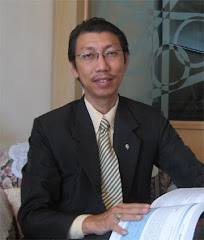Reality check: many council employees carry out their duties err... faithfully? sincerely? yes, robotically! They come to work, do what is necessary and go home; no more, no less. You can identify them by their plastic smiles (probably superglue). Of course, there are some diligent ones (usually those freshies who have not yet been influenced by the exisiting 'culture'). And some are downright lazy and lackadiasical (since the system is such that nobody gets the sack and everybody gets the bonus and increment, so why exert oneself?). Finally, a small number have risen to the level of little emperors with their kingdom that no one can touch!
This small group is the decision-makers. Councillors must live in fear of them. The Councillor is expected to be nice to them to get things going. 'Tolong' is a common key. And it is not the simple manners of saying 'please.' Must place them on a pedestal, give them high praises, pat their backs, and accept their decisions (spoken and implied).
These highly sensitive people are never questioned about their 'personal' time (especially during office hours) or whereabouts (one was accidentally discovered taking a nap while another was 'found' in his farm). I can imagine one 'entertaining' another government servant on the green or in a club. Ruffle their feathers and you die!
And so questions and suspicions quietly arise at the back of our minds: why only a few contractors get the tenders, why buy only from one supplier, why this, why that? Cronies? Kickbacks?
Even though our Councillors are generally united in our proposals, many fail to realize that as a Council, it is our individual and collective duty to direct the officers and employees to carry out our decisions. It is our right to question decisions and seek the truth. Instead, we are led by our nose on many occasions, simply because no one wants to be the 'bad' guy in putting his/her foot down. Some live in fear, telling me that it is better to have a devil you know than a replacement devil nobody knows.
The first Council meeting was held to brief all Councillors and for us to take our oath of office. The second meeting saw many questions being asked (we had lunch after 3.00pm!), simply because all of us were new and needed to know how things move, and at the third meeting, we had to sit through the briefing again because a new YDP had been appointed and need to be sworn in. There simply wasn't enough time to really sort out the questions and suspicions!
